From February 21-23, 2014, the Rida Institute will offer a three day crash-course in re-imagining what is possible within our schools. The question "what is the purpose of education?" frames the Institute, as participants explore the educational theories of Paolo Freire, Jeff Duncan-Andrade, Eleanor Duckworth,James Boggs and Grace Lee Boggs and others.
THE RIDA INSTITUTE
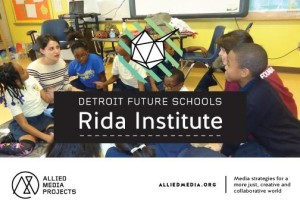 Are you a K-12 classroom teacher with visions of fostering transformative education in your classroom, but drowning in the day-to-day of federal policies, school bureaucracy and individual student needs?
Are you a K-12 classroom teacher with visions of fostering transformative education in your classroom, but drowning in the day-to-day of federal policies, school bureaucracy and individual student needs?
Do you find yourself asking, "Where do I even begin to fix things?"
Are you someone who works with teachers – either as an administrator, a consultant, or support staff? Do you find yourself wondering where to begin when tasked with helping teachers think through their practice?
Are you looking for a way to reinvent, reenergize, and re-imagine teaching and learning?
The Rida Institute will feature hands-on training and discussion, and plenaries with local and national education specialists.
WHEN: Friday, February 21 - Sunday, February 23, 2014 WHERE: Allied Media Projects | 4126 Third St. | Detroit, MI WHO: K-12 instructors, administrators, support staff
Seats are limited. Click here to apply today!
The deadline to apply is December 15, 2013 January 6, 2013.
Registration ranges from $150 for individuals to $500 for institutions sending a representative. The cost for institutions is used to subsidize the cost for individual teachers paying their own way both locally and nationally.
There are affordable housing options in Detroit. Please indicate your interest viathe application and we will follow-up with your interest with more details.
THE RIDA CLASSROOM
Central to Detroit Future Schools is a unique framework called the DFS Rida Framework that embodies the "action-reflection praxis" articulated by Paolo Freire, and is inspired by the the study of effective practices in urban classrooms, "Gangsta, Wanksta, Rida" by Jeff Duncan-Andrade. As Duncan-Andrade writes in the article, "'Rida' is a popular cultural term that refers to people who can be counted on during times of extreme duress. The term is often referenced in hip-hop with the expression, 'ride or die', meaning that Ridas are people who would sooner die than let their people down." Throughout the article, Duncan-Andrade continues to articulate the "five pillars of effective practice in the Rida's classroom." These pillars include: a critically conscious purpose, duty, preparation, a Socratic sensibility, and trust.
This research and these pillars are what have informed the development of the DFS Rida Institute. The Rida Framework allows participants to gain the type of perspective a Rida teacher would need to authentically serve their students and community. Schools traditionally demand that teachers begin to think about their work by first looking at their content and state standards that are usually far removed from the lived realities of students. As a curriculum development tool, this framework requires that participants first deeply reflect on their contexts and instructional beliefs, demands and goals in order to give school content a critical sense of place and purpose. From this balcony view, participants then articulate practices (action) that will yield desired/outlined outcomes within their classrooms which they will document and evaluate via pre-determined metrics (reflection).
The Rida Framework facilitates participants outlining the following elements as they relate to their teaching:
Context → Purpose → Vision → Principles → Skills → Practices → Content → Metrics
Moving from theory to practice, participants will use the DFS Rida Framework to chart a path towards actualizing transformative education in their own classrooms and schools. DFS defines transformative education as the thing that happens when teachers, students, and school community members are mutually engaged in the work of becoming more fully human. Participants will leave the Rida Institute with the instructional practices, evaluation tools, and network of support necessary to bring this definition to life.
Click here to apply to the DFS Rida Institure!
★ ★ ★ ★ ★ ★ ★ ★ ★
Keep us going and growing: Sign-up to be an AMP sustainer!


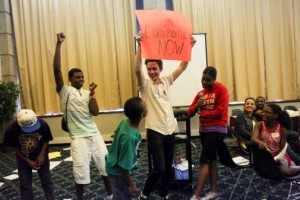 Detroit Future Schools gathered parents, artists, students, teachers, community members, and youth organizers from across Metro-Detroit in our attempt to answer this question.
Detroit Future Schools gathered parents, artists, students, teachers, community members, and youth organizers from across Metro-Detroit in our attempt to answer this question.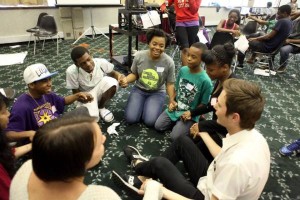 At Detroit Future Schools, we are working to prove that teaching to our humanity in our education system as a whole is both pragmatic and revolutionary. We are teaching and learning in ways that foster
At Detroit Future Schools, we are working to prove that teaching to our humanity in our education system as a whole is both pragmatic and revolutionary. We are teaching and learning in ways that foster 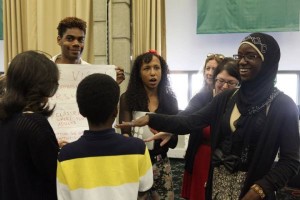 Our day together was far from perfect and our work is far from done but what I take away from this Network Gathering is the optimism, hope and grit it takes to actualize the world we want to see. I want to have students walk out of classrooms saying what I heard students saying at the end of our time together: "Thank you for this opportunity to speak with adults about school" and "this was one of the best days of my life." I want to see singing, drawing and beat-making infused into our core content areas in schools and not reserved for electives.
Our day together was far from perfect and our work is far from done but what I take away from this Network Gathering is the optimism, hope and grit it takes to actualize the world we want to see. I want to have students walk out of classrooms saying what I heard students saying at the end of our time together: "Thank you for this opportunity to speak with adults about school" and "this was one of the best days of my life." I want to see singing, drawing and beat-making infused into our core content areas in schools and not reserved for electives.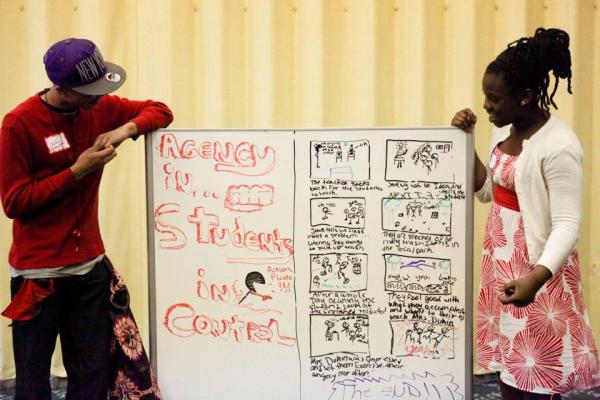
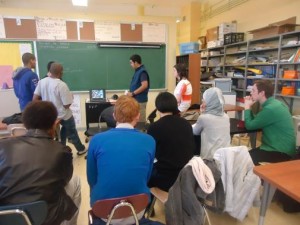 Teachers and artists-in-residence from AMP’s
Teachers and artists-in-residence from AMP’s